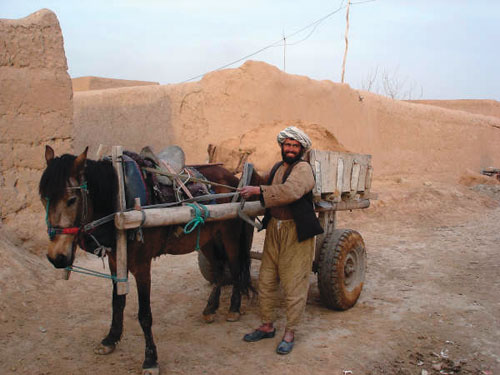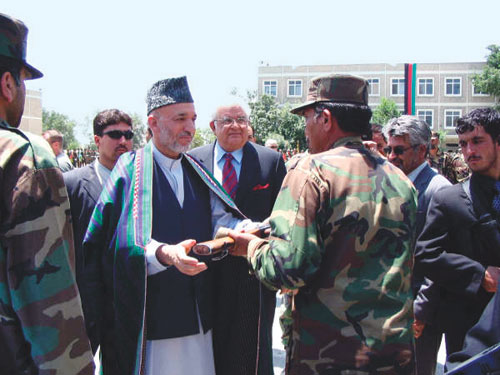Japan's Official Development Assistance White Paper 2005
Column II-8 Report from Afghanistan on Disarmament, Demobilization, and Reintegration of Ex-combatants (DDR) - Counselor in Charge of DDR in the Japanese Embassy in Afghanistan, Yuichi Inoue

Discharged soldier in Mazar-e-Sharif who has become a transport operator (Photo: Afghanistan's New Beginnings Program (ANBP))
Reconstruction assistance for Afghanistan is a typical example of peace-building, one of the new sectors of international contribution in the foreign policy of Japan. In Afghanistan, the restoration of public security is indispensable for the free and fair parliamentary elections in September 2005, which was held following the presidential election in October 2004. It is equally necessary for the reconstruction and building of a climate in which post-reconstruction socio-economic development can be smoothly implemented. For these reasons, Japan has provided DDR support to disband the armed factions subordinated to the former Afghanistan Military Force that remain throughout Afghanistan, recover their weapons, and reintegrate discharged soldiers into local communities.
The DDR program was commenced in October 2003. From then onward, it has disarmed approximately 63,000 ex-combatants and collected approximately 35,000 small firearms and 9,000 heavy firearms. The program concluded on July 7, 2005. In the capital city of Kabul, a ceremony was held to commemorate the completion of the disarmament phase of the DDR program for Afghanistan Military Force, where President Hamid Karzai attended. He addressed; "This contribution will be recorded forever in the Afghan history. By returning their weapons, discharged soldiers will have the chance to play an even greater role in nation rebuilding. I would like to express my gratitude to the international community, particularly Japan, for the cooperation which brought DDR to a successful conclusion." The most important task of DDR is to provide vocational training and other supports for social rehabilitation and to steadily reintegrate ex-combatants into their local communities, in order to prevent them from taking up arms again or becoming involved in drugs trafficking still rife in Afghanistan. Japan will continue the support for social rehabilitation until June 2006.
A discharged soldier I met in Mazar-e-Sharif in the northwestern part of Afghanistan bought a horse and cart with support from Japan and has begun a transportation business. I also met a discharged soldier who has reopened the family grocery business in the western city of Herat, another discharged soldier who runs a farm while learning to read and write with his son in the northern town of Kunduz, and another discharged soldier undergoing vocational training to achieve his lifelong dream of becoming a tailor in the eastern city of Jalalabad. A former commander I met in the southern city of Kandahar participated in a training program in Japan and has become exceptionally friendly toward Japan.

President Hamid Karzai of Afghanistan accepting the last weapons from soldiers under the DDR program (Photo: Afghanistan's New Beginnings Program (ANBP))
In Afghanistan, there are also armed factions that did not belong to the former Afghanistan Military Force. Because they have come to be an obstacle to the restoration of public security, it needs to take the lead in the international community in supporting the government of Afghanistan to disband and disarm them. Although DDR is not a long-term challenge like the eradication of drugs, it is regarded as a precondition for the reform of public security in Afghanistan. Thanks to the successful disbandment of the former Afghanistan Military Force and with the completion of DDR in sight, a new hope has come for restoration of public security and reconstruction assistance in Afghanistan.


 Next Page
Next Page